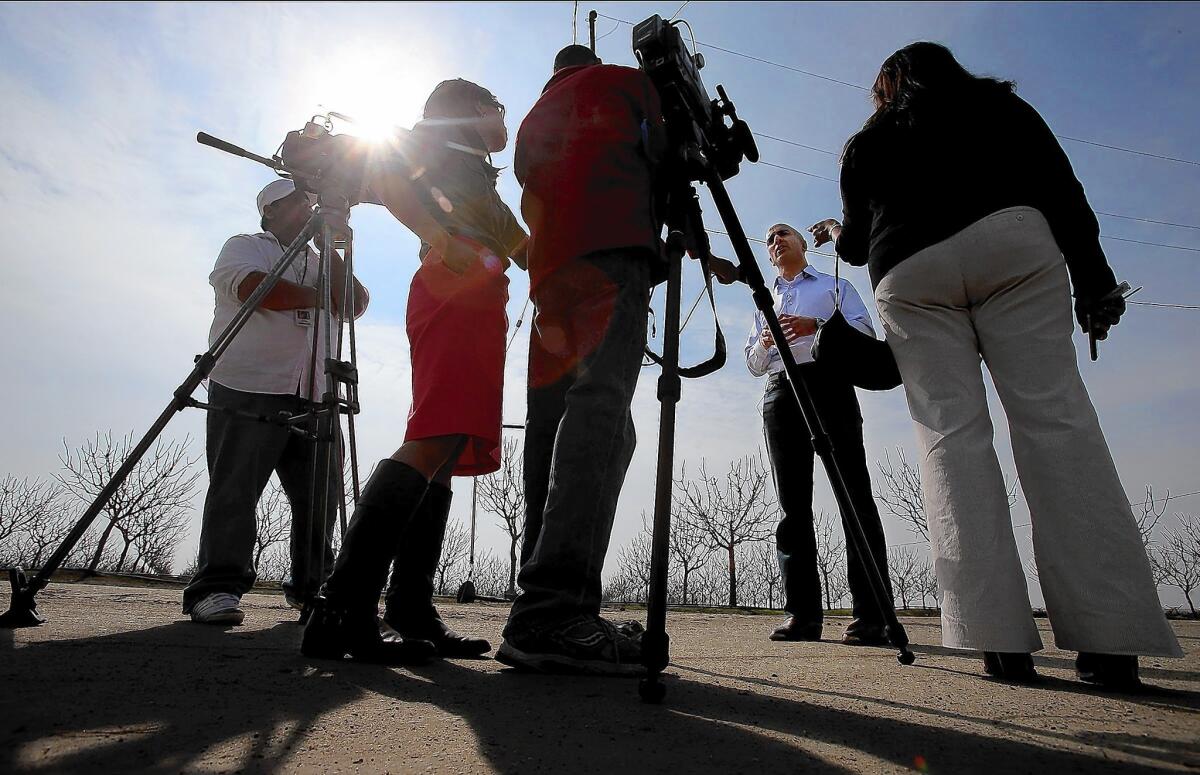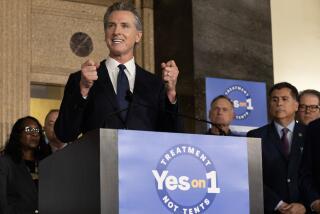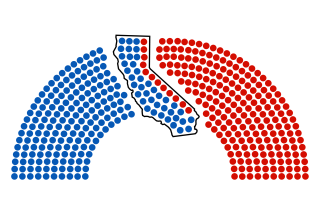Like his ideas or not, Kashkari is at least offering a plan

SACRAMENTO — Give Neel Kashkari credit: He’s thinking big and telling people his thoughts.
The Republican has little chance of beating Gov. Jerry Brown and being elected governor. But don’t tell him. He’s campaigning hard and talking to anyone who will listen.
And he’s sketching out a substantive plan, just in case, that addresses what polls show is Californians’ No. 1 priority: Improving the state’s economy and creating more jobs.
There are plenty of holes to poke at in the former U.S. Treasury official’s 10-point “jobs plan” unveiled Tuesday. But it’s out there. Where is Brown’s? Don’t bother looking.
Kashkari’s No. 1 personal priority right now is gaining attention and getting known. Few are aware that he’s trying to challenge the popular Democratic governor’s bid for a record fourth term.
If there’s a GOP establishment favorite — and there may not be, because the business lobby seems to be submissively lining up behind the centrist incumbent — it is Kashkari, 40. He’s a first-generation American whose parents emigrated from India, an investment banker and onetime federal bailout czar.
He’s a pro-business fiscal conservative. But he also is a social moderate who doesn’t think the government should interfere with same-sex couples desiring to merry or women seeking an abortion. And he believes there should be a path to citizenship for immigrants who entered the country illegally.
One other thing, he says. He’s a gun owner. But if you’re obsessed with firearms and believe everyone has a right to arm himself to the teeth, better choose another candidate — like tea-party favorite Tim Donnelly, a Twin Peaks assemblyman and outspoken all-purpose conservative.
Right now, Donnelly is running ahead of Kashkari in the little-noticed race for second in the June open primary. The top two finishers will face each other in the November runoff.
A poll released Wednesday by the Public Policy Institute of California shows Brown favored by 47% of likely voters, followed far back by Donnelly at 10%. Kashkari is tied at 2% — that’s not a typo — with the virtually invisible Laguna Hills Mayor Andrew Blount. And 36% say they don’t know whom to support.
One faint ray of hope for the Republicans: Brown’s job rating is down a bit from January among likely voters. Two months ago, 60% approved of his job performance; now 52% do.
Brown’s approval has dropped, theorizes Mark Baldassare, the institute’s president and pollster, because the governor has been rather aloof the last two months. “He has not been out there making a lot of noise,” Baldassare says. In January, he was touting “incredibly good news” about the end of budget deficits.
Also not helping Brown is his tenacious pushing of the divisive bullet train. The poll found likely voters opposing the $68-billion Los Angeles-to-San Francisco project by 50% to 45%.
Kashkari calls it “the crazy train.” Part of his plan is to ask voters to redirect $9 billion in high-speed rail bonds they previously approved to spending for new water storage — dams and aquifers, north and south. Baldassare’s poll found that the water shortage has risen to Californians’ No. 2 concern, behind the economy and jobs.
“The water issue has come out of nowhere,” the pollster says. “It’s a political wild card. The budget crisis has subsided. Now the governor’s dealing with a different kind of scarcity. It’s going to be the issue to watch.”
Arguing for shifting the bullet bucks to water spending, Kashkari declares: “In economics there’s a ‘sunk cost’ concept. If you made a bad decision and wasted money, it doesn’t mean you should keep throwing good money after bad. Cut your losses and make the right decision.”
Kashkari is less emphatic about another controversial Brown project — boring two giant tunnels under the Sacramento-San Joaquin River Delta to carry fresh northern water south. It’s a $25-billion proposal.
“I’m concerned the price tag keeps going up and up and am not convinced it’s the best [water] conveyance system,” Kashkari says. “First we should start with building more storage.”
Kashkari’s favorite proposal, however, seems contradictory to his concern about water. He calls for aggressive hydraulic fracturing — or fracking — to loosen 15.4 billion barrels of oil buried in Central California’s Monterey Shale Formation.
Fracking requires boatloads of water mixed with sand and chemicals. Brown is moving cautiously toward fracking; he signed regulatory legislation last year. But environmentalists are loudly protesting.
Environmentalists, Kashkari contends, “have to come up with their own plan to create hundreds of thousands of good jobs or explain to people out of work at food banks why they don’t care about them.”
Kashkari is like the guy throwing a bunch of stuff on the wall, hoping some of it sticks and gets attention.
Any company that moves into California and creates at least 100 jobs should be exempt from paying corporate taxes for 10 years, he asserts. Same with any California manufacturer that expands and hires 100 more workers.
“This costs [the state] almost nothing,” he argues. “It’s not tax revenue we would otherwise get. I really want to move the needle and put California in the hunt.”
He’d also dump all business regulations after 10 years unless they were renewed by an obscure state entity called the Little Hoover Commission. Wince.
There’s plenty to criticize in Kashkari’s plan — including the political impracticality of getting any of it passed by a Democratic Legislature.
But it is substance. And that’s sorely lacking in most political campaigns.
More to Read
Start your day right
Sign up for Essential California for news, features and recommendations from the L.A. Times and beyond in your inbox six days a week.
You may occasionally receive promotional content from the Los Angeles Times.







